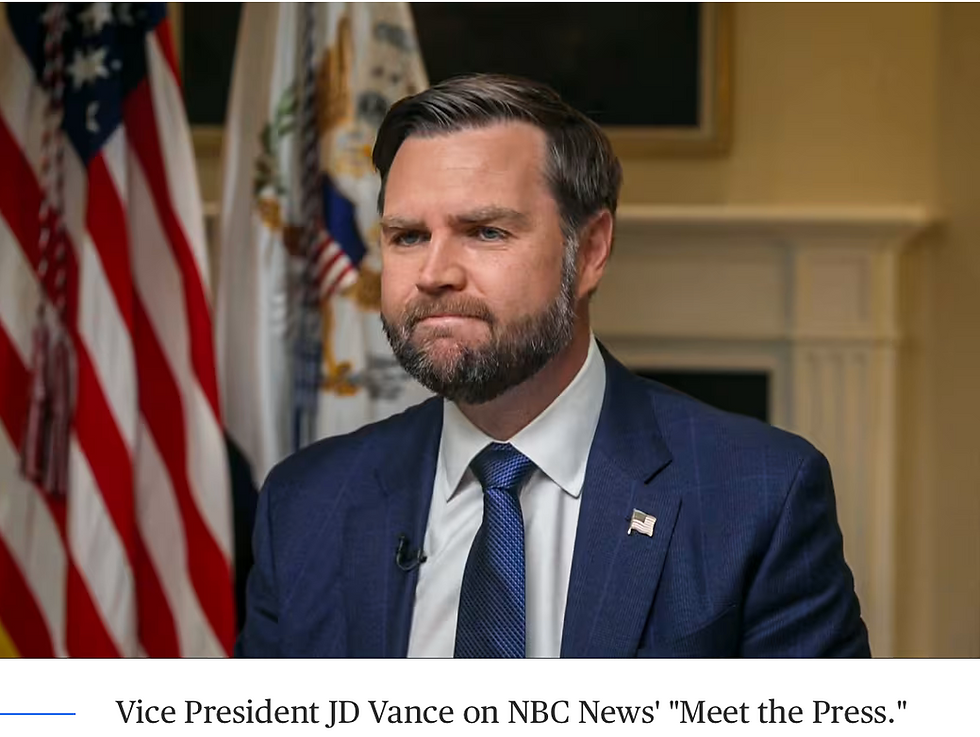JD Vance and the End of History
- Aug 26, 2025
- 3 min read
Updated: Aug 26, 2025
I keep thinking about JD's rather peculiar interpretation of military history. I've no idea why I keep thinking about it, since virtually everything Vance says is, to be charitable, peculiar. Nonetheless, his recent pronunciamento on "Meet the Press" about wars and their resolutions somehow captured my interest and wouldn't let go. Hence, I take to my keyboard. Because he said this:
If you go back to World War II, if you go back to World War I. If you go back to every major conflict in human history, they all end with some kind of negotiation.
Before matriculating at Yale Law, Vance attended Ohio State University, one of this nation's finest institutions of higher education. (Not for much longer, under Trump, but that's another story.) He majored in the humanities, so somewhere in that mix he must have studied history. And considering that OSU is indeed one of this nation's finest institutions of higher education, I'd bet my voter registration card that no lecturer in history ever told JD that "every major conflict" ended in "some kind of negotiation."

Since the veep cited the two global wars in which we were involved, let's look at just the U.S.'s history of major conflicts. While doing so, let's also keep in mind that Vance's historical judgment was universal — thus merely one exception to his rule unravels its entirety. But we'll look at more than one anyway, because unlike Vance, we're scrupulous.
Our War of Revolution saw its denouement in the siege of Yorktown. There, in 1781, British Gen. Cornwallis surrendered his army to George Washington's forces, which were aided indispensibly by those of the French army and Louis XVI's naval power, which boxed in the Brits. (Poor Louis; for that, he got his head chopped off. France's war debt was so oppressive it led to its revolution. But again, that's another story.) It's true that the war officially ended with the Treaty of Paris two years later. The British had had enough, though. With the fall of Cornwallis' forces — the Southern Strategy, his army's last hope — Parisian negotiations were but a formality.
Not so with our next run-in with the Brits. The War of 1812 fizzled to an 1814 conclusion with the Treaty of Ghent (before which my all-time favorite American negotiator, Henry Clay, would stumble in at 4 a.m. just as his roommate, straightlaced negotiator John Quincy Adams, was rising, and after which Andrew Jackson fought the Battle of New Orleans — oops).
Yet a bit more than 30 years later, the U.S. rolled over Mexico in a war that Ulysses Grant later said was "one of the most unjust ever waged by a stronger against a weaker nation." Its conclusion in the Treaty of Guadalupe Hidalgo, 1848, was little more than the victor telling the loser, You'll take it and you'll like it. Not really "some kind of negotiation," JD.
The Civil War? President Lincoln refused a negotiated settlement, preferring instead to crush the South. Gen. Robert E. Lee surrendered his sword to Grant. Game over. "The Great War" of 1914-1918 wrapped up with no treaty but an armistice; a huge mistake by the Allies against the Central Powers. Austria-Hungary and the Ottoman Empire had already resigned the fields of battle when Germany collapsed, although its citizens were unaware of how dire the situation was. This provided Hitler the opportunity to claim that Germany had not lost the war, it was, rather, stabbed in the back. But this one, like the War of 1812, we'll give to JD. It ended with a negotiated peace.
Its inexorable sister war a couple decades later did not. And I'm sure undergrad JD read about it. Dismissing any need for negotiations, the Allies actually did "obliterate" the fighting ability of the Triple Axis — no overhead reconnaissance needed, which, as you and especially Lt. Gen. Jeffrey Kruse know, obliterated Trump and Vance's claim about Iran.
All that being said, JD Vance's historical asininity was what it was because he wanted to be, that being the modus operandi of his post-truth regime. He said, as a universal proposition, that negotiation is how wars ultimately get settled only to justify Trump's idiotic, and worse, ignorant attempts at a Putin-Zelensky confab — a vision about as likely as FDR sitting down with Hitler in early 1945.
I shall resist a PolitFact "Pants on Fire." But on hearing JD Sunday, historians' hair lit up. For with this clown, it's the end of known history.
* This piece is cross-posted at my Substack page; subscribe to be notified of new posts, no cost.
Please do submit Gavin's name to the committee.
Well, Desperate Donnie craves that Nobel Peace Prize more than anything, simply because...Obama. And JD's right there to bolster his delusions. For myself, I think nominating Gavin Newsome would tip 47's teetering mind into the abyss.